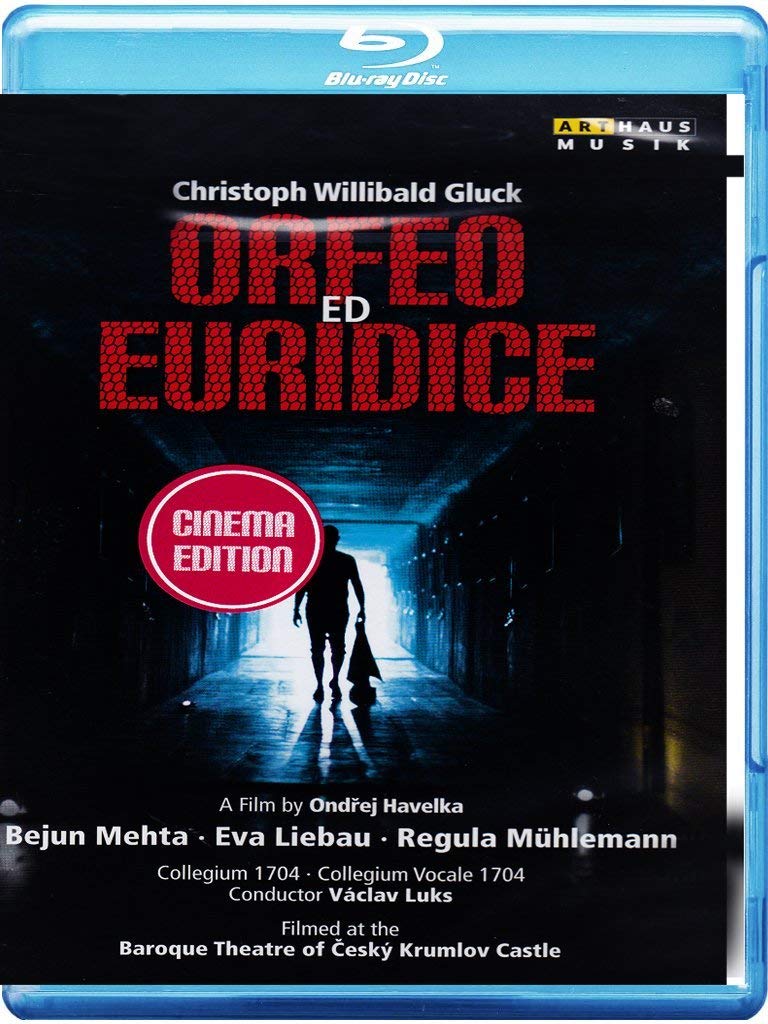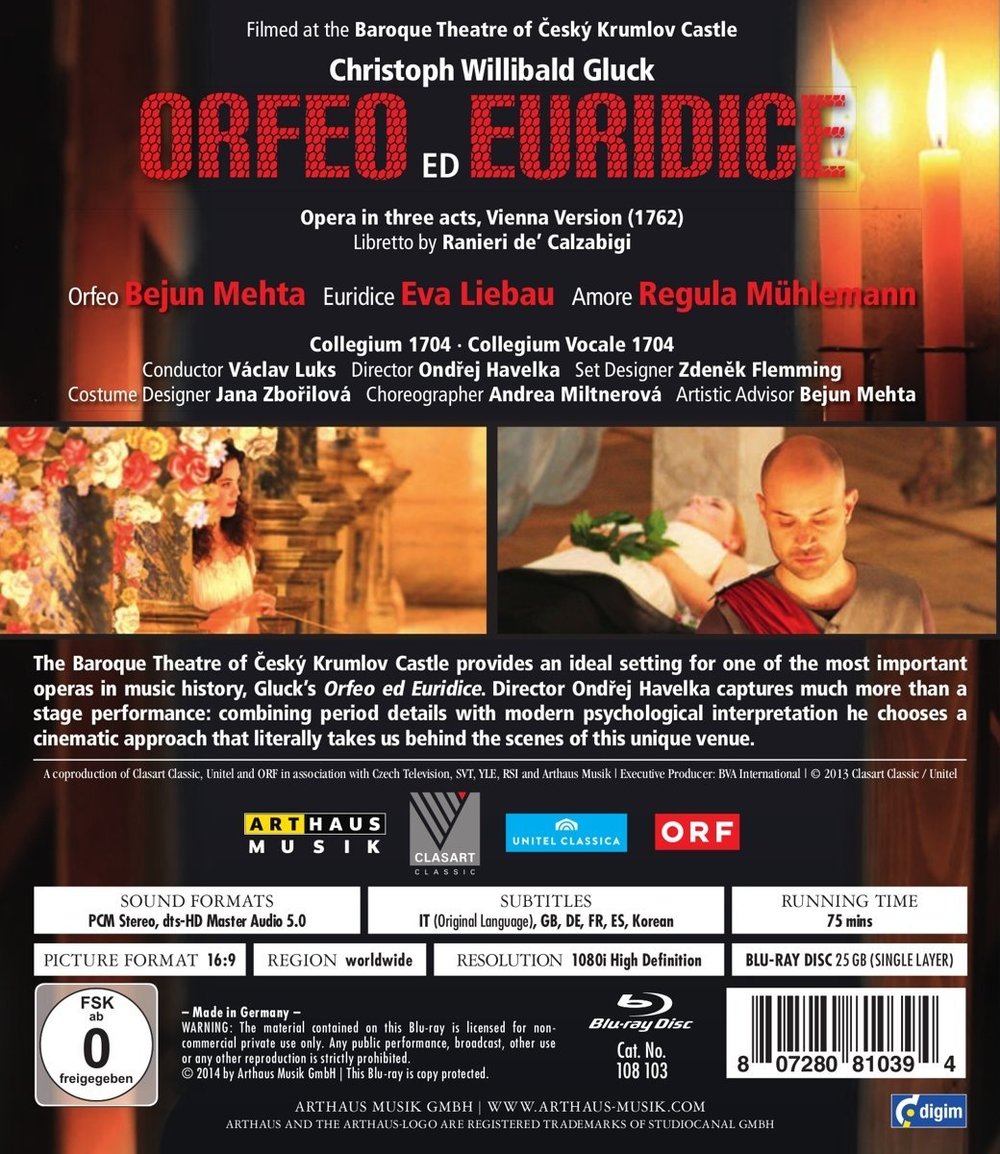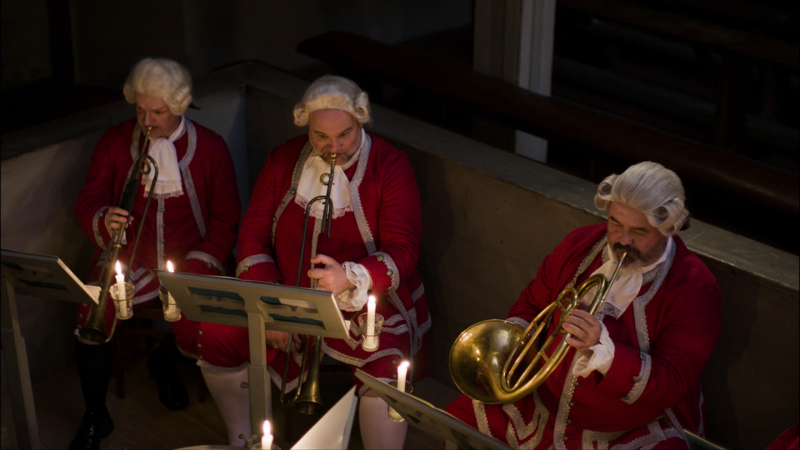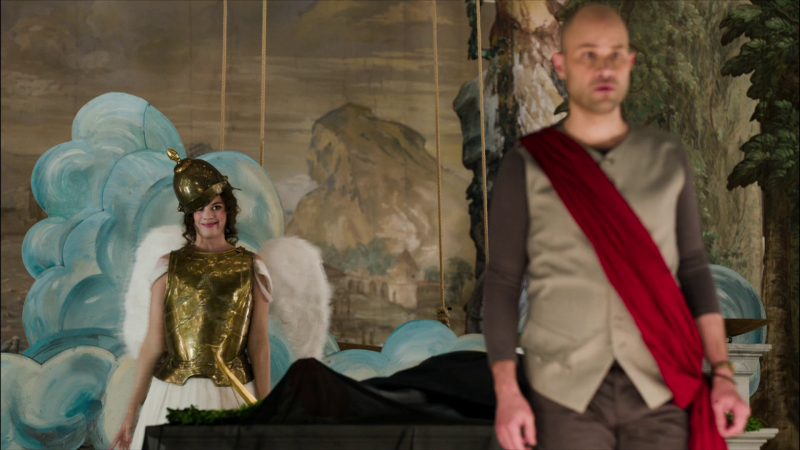

Gluck Orfeo ed Euridice opera to a libretto in Italian by Ranieri de' Calzabigi (Vienna version from 1762). Directed 2013 by Ondřej Havelka at the Baroque Theatre of Český Krumlov Castle. Stars Bejun Mehta (Orfeo), Eva Liebau (Euridice or Eurydice), and Regula Mühlemann (Amore). Václav Luks conducts the Collegium 1704 and Collegium Vocale 1704. Sets by Zheněk Flemming; costumes designed by Jana Zbořilovká, choreography by Andrea Miltnerová; artistic advice from Bejun Mehta. Directed for TV by Jan Malíř; edited by Marek Opatrný. Executive production by Jiří Hubač; produced by Hebert G. Kloiber. Sung in Italian. Released 2014, disc has 5.0 dts-HD Master Audio sound. Grade: A
This title heads in an unusual direction because it is not just a recording of a live opera performance (which is, of course, the origin of most of our HDVD operas). Nor was it shot like a movie with endless takes in scattered locations. It's in between — a movie made over 7 days in the Český Krumlov Castle with shooting in its baroque theater stage, auditorium, backstage areas, and castle basement. The director also used historic sets and props belonging to the house. Candles and burning lamps provided most if not all of the light. So this production gives us a good idea what a performances of the original Orfeo ed Euridice may have looked like. But as the screenshots help you see, the film goes further afield than that. For example, scenes are shown in parts of the castle a live audience would newer see. And documentary-style footage is included with real-world images that form a conceptual envelope surrounding both the opera libretto and the story as filmed. The producers call this multi-layer approach a "cinematic adaptation."
We scooped Gramophone on this one. A few days after we published this review, their September 2014 came in the mail, and the editors named this title as their "DVD/Blu-ray of the Month." As usual, you can't tell if reviewer Richard Lawrence saw the DVD, the Blu-ray, or both. Lawrence liked all the musical aspects of the show, but he had trouble with the cinematic adaptation made possible by Blu-ray technology. Later, Opera News called this one of the 5 best opera Blu-rays for 2014 (January 2015, at page 51).
Now let's turn to some screenshots starting with the orchestra in authentic livery reading sheet music by candle light:
The action opens with the funeral of Eurydice (Eva Liebau). You will recall she married Orfeo in the morning and killed by a poisonous snakebite later that day. Here we see the funeral of Eurydice and the orchestra in the pit (the auditorium is empty):
Countertenor Bejun Mehta as Orfeo:
The grief-stricken Orfeo rails against the gods who have cut Eurydice's life so short:
Suddenly Regula Mühlemann appears as Amore (Cupid). The three luckiest people I know of are Bill Gates (Microsoft), Bill Clinton (President of the USA at age 46), and Regula Mühlemann. She got out of school in 2012 and has already appeared in the following 4 HDVDs (in addition to this title): Hunter's Bride, Die Zauberflöte, Das Labyrinth, and L'eilsir d'amore.
Regula's HDVD roles all require agile singing along with comic acting chops. She is a natural at making faces. But several of the shots also show that she is quite beautiful. I think she can probably handle heavy-duty lead soprano roles as well as her trademark supporting gigs. Here Amore has good news:
And bad news. If Orfeo looks at Eurydice, she will suffer a second death. Nor will Orfeo be allowed to explain this requirement of the gods to Eurydice:
Orfeo is deeply perturbed by the difficult restrictions laid down by the gods and delivered by such a goofy messenger:
Orfeo starts his dangerous journey to the underworld through the basement caverns of Český Krumlov Castle. He meets the furies and his scenes with them were shot somewhere off-stage:
The three-headed dog Cerberus guards the gates of the underworld. The dog shown here is, I think, an historic prop belonging the the castle:
Orfeo sees a vision of Eurydice on the basement floor:
But his singing is so pleasing even the voracious furies feel sympathy:
Orfeo is admitted to the underworld. It's not a place of suffering, but a paradise populated by the Blissful Sprits. I think the Blissful Spirits were members of the Collegium Vocale 1704 who are trained to sing early music. Here it appears they were also asked to act and dance, which would take them beyond their usual job description. They do their best, but they tend to look awkward and self-conscious:
The Blissful Spirits return Eurydice to Orfeo, and the couple immediately leaves for the hike back to earth:
You know the story---Eurydice is already used to Paradise, which is quickly habit-forming. Further, she doesn't understand why Orfeo will not look at her, and why he is in such a hurry:
Gradually Eurydice wears down Orfeo's will power with her entreaties for at least one glance:
Orfeo looks, and Eurydice dies a second time. This leads to Orfeo's most famous aria:
The original Italian version had a happy ending when Jove sends Amore to bring Eurydice back to life as a reward for Orfeo's devotion and bravery. Some directors prefer a sad ending and finish the show with Orfeo's lament. How do director Ondřej Havelka and artistic advisor Bejun Mehta end their production? Well, they have their own unique twist (I think), and you will have to get the disc to experience it.
The star singers are all great. The orchestra and the chorus sound authentic and pleasant enough. The balance between singers and orchestra is fine and the SQ is good. The video is slightly soft. This may in part come from the low light; and the director probably wanted a warm, slightly-muted film look rather than razor-sharp video.
Purists and die-hard early music fans might prefer to see this opera shot 100% on a stage live in stand-and-deliver mode with no fancy stuff. But for me, this Havelka/Metha concoction is about as good as it can get for a traditional rendition of Orfeo ed Euridice using a countertenor or a soprano for Orfeo. If this is too much high-pitch singing for your taste, you might prefer a recording of the French version of the opera, which casts a tenor as Orfeo. You might even like the camp Orphée et Eurydice with Robert Alagna as Orfeo (the traditional critics mostly hated it, but I think it's groovy).
The January 2015 Opera News called this one of the best 5 opera Blu-ray releases for 2014.





















